
Journal of Financial Regulation
Scope & Guideline
Advancing the discourse on financial governance.
Introduction
Aims and Scopes
- Regulatory Frameworks and Compliance:
Explores the structures and effectiveness of financial regulatory frameworks across jurisdictions, including compliance mechanisms and the impact of regulations like MiFID II. - Risk Management and Financial Stability:
Focuses on the analysis of systemic risks in financial markets and institutions, including studies on sovereign debt, banking regulations, and climate-related financial risks. - Technological Innovations in Finance:
Investigates the implications of emerging technologies such as artificial intelligence and decentralized finance (DeFi) for financial regulation and governance. - Consumer Protection and Ethical Standards:
Examines issues related to consumer protection in financial markets, including the regulation of financial advisers and the ethical considerations in financial transactions. - International Financial Regulation:
Analyzes the global dimensions of financial regulation, including the interactions between national regulations and international regulatory standards.
Trending and Emerging
- Impact of Artificial Intelligence on Financial Regulation:
With the rise of AI in finance, there is an increasing focus on how these technologies can be regulated effectively to enhance security and compliance. - Climate Change and Financial Regulation:
The intersection of climate change and financial regulation is becoming a significant area of interest, with research exploring how regulations can address environmental risks. - Decentralized Finance (DeFi) and Regulation:
The emergence of DeFi has prompted a surge in studies assessing the regulatory challenges and frameworks necessary for governing these innovative financial systems. - Cybersecurity in Financial Systems:
As financial systems become more digitized, the importance of cybersecurity in regulatory frameworks is gaining attention, with a focus on safeguarding against emerging threats. - Consumer Rights in Financial Transactions:
There is an increasing emphasis on consumer protection and the ethical standards required in financial services, reflecting a growing awareness of the need to safeguard consumers.
Declining or Waning
- Traditional Banking Regulation:
There is a noticeable decrease in papers focusing on traditional banking regulations as newer topics like fintech and decentralized finance take precedence. - Post-Crisis Regulatory Reforms:
Research centered on the immediate aftermath of the 2008 financial crisis and the associated reforms has waned, suggesting a shift towards contemporary regulatory challenges. - Historical Analysis of Financial Crises:
The journal has seen fewer papers that delve into the historical context of financial crises, indicating a move towards more current and forward-looking analyses.
Similar Journals
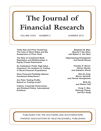
JOURNAL OF FINANCIAL RESEARCH
Bridging Theory and Practice in FinanceThe JOURNAL OF FINANCIAL RESEARCH, published by WILEY, stands as a pivotal platform for disseminating innovative research in the fields of finance and accounting since its inception in 1978. With an ISSN of 0270-2592 and an E-ISSN of 1475-6803, this journal aims to address contemporary challenges and trends within the financial research landscape. It has achieved notable recognition, being placed in the Q2 category for both Finance and Accounting in the 2023 rankings, signifying its relevance and impact within the academic community. Although it does not currently offer open access, the journal is accessible through various academic databases, catering to a diverse audience of researchers, professionals, and students keen on advancing their knowledge and understanding of financial systems and methodologies. With an evolving scope that encompasses empirical studies, theoretical frameworks, and practical applications, the JOURNAL OF FINANCIAL RESEARCH is committed to contributing valuable insights into the complexities of financial practices and policies.
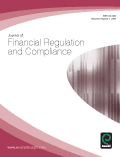
Journal of Financial Regulation and Compliance
Illuminating Challenges in Regulatory FrameworksThe Journal of Financial Regulation and Compliance, published by Emerald Group Publishing Ltd, serves as a vital resource for researchers, professionals, and students in the fields of finance, strategy, and management. With an ISSN of 1358-1988 and E-ISSN 1740-0279, this esteemed journal has been at the forefront of scholarly dialogue since its inception in 1996, and it will continue to publish until 2024. As a recognized entity in the academic community, it holds a Q3 category ranking in both Finance and Strategy and Management according to the 2023 metrics. The journal is indexed in Scopus, with a respectable rank of #278 out of 478 in its category, placing it in the 41st percentile, further underscoring its contribution to relevant academic discourse. Although it does not currently offer Open Access, it produces high-quality, peer-reviewed content that addresses the latest developments and challenges in financial regulation and compliance. This journal is essential for anyone looking to engage with contemporary issues and theories shaping the financial landscape.

JOURNAL OF FINANCIAL SERVICES RESEARCH
Advancing knowledge in financial services research.The JOURNAL OF FINANCIAL SERVICES RESEARCH, published by SPRINGER, serves as a critical platform for scholarly discourse in the fields of finance, accounting, and econometrics. With a dedicated focus on innovative research and rigorous analysis, this journal has maintained a respectable Impact Factor, placing it in the Q2 category for 2023 across multiple academic disciplines including Accounting, Economics, and Finance. Since its inception in 1987, it has contributed significantly to the advancement of knowledge and practice within financial services, making it essential reading for researchers, professionals, and students alike. The journal is based in the Netherlands and hosts contributions that address contemporary issues in financial systems, markets, and institutions. Despite its non-open access format, the journal remains highly relevant, with Scopus rankings indicating its solid position within its peer group, especially in the realms of Economics, Econometrics, and Finance. As the journal approaches its converged coverage through 2024, it aims not only to disseminate high-quality research but also to foster a deeper understanding of the dynamic financial landscape.

Risks is an esteemed Open Access journal published by MDPI, based in Switzerland, dedicated to exploring multifaceted dimensions of risk across various fields, including Accounting, Economics, Finance, and Management. Since its inception in 2013, the journal has fostered academic discourse by providing a platform for high-quality research that addresses contemporary challenges and theoretical advancements within these disciplines. With a commendable ranking in the 75th percentile for Economics, Econometrics and Finance, and distinction in Accounting and Strategy Management, Risks maintains robust academic quality that resonates within the global research community. The journal not only prioritizes accessibility with its Open Access model but also aims to bridge the gap between academia and industry through rigorous peer-reviewed publications. Researchers, professionals, and students alike will find Risks to be an invaluable resource for innovative insights and evidence-based analyses in the field of risk management.
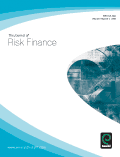
Journal of Risk Finance
Illuminating the landscape of risk management practices.The Journal of Risk Finance, published by Emerald Group Publishing Ltd, is a premier academic journal dedicated to advancing the understanding of risk management and finance practices since its inception in 1999. With a strong foothold within the Q2 rankings in both Accounting and Finance categories, it proudly holds a significant place in the scholarly landscape, ranking #54 out of 317 in the Scopus Economics and Finance category, placing it in the 83rd percentile. The journal aims to facilitate the exchange of innovative research and practical insights, catering to an audience of researchers, professionals, and students eager to explore contemporary issues in risk finance. While not an open access journal, it provides numerous access options, ensuring that essential findings reach a broad readership. Set in the United Kingdom and covering publications up to 2024, the Journal of Risk Finance continues to be an indispensable resource for those committed to this critical field.

Journal of Financial Market Infrastructures
Advancing Understanding of Market DynamicsThe Journal of Financial Market Infrastructures (ISSN: 2049-5404; E-ISSN: 2049-5412), published by Incisive Media, is a premier academic journal dedicated to the evolving landscape of financial market infrastructures. With a focus on the critical examination of systems that underpin financial markets, this journal serves as a vital resource for researchers, professionals, and students alike who seek to understand the complexities and innovations in this field. Although the journal is not open access, it provides valuable, peer-reviewed content that contributes significantly to discussions surrounding market efficiency, regulatory frameworks, and technological advancements in finance. Positioned at the intersection of finance, technology, and policy, the Journal of Financial Market Infrastructures aims to disseminate cutting-edge research while fostering collaboration among scholars, practitioners, and policymakers internationally. By bridging theoretical insights with practical applications, this journal plays a crucial role in shaping the future of financial markets.

Annual Review of Financial Economics
Pioneering Comprehensive Reviews in Financial EconomicsAnnual Review of Financial Economics, published by Annual Reviews, stands as a pivotal journal in the fields of Economics and Finance, recognized for its rigorous analysis and comprehensive reviews since its inception in 2010. With an impressive impact factor reflected in its Q1 ranking in both Economics and Econometrics and Finance for 2023, this journal serves as an essential resource for researchers, professionals, and students keen on understanding the dynamic interplay of financial theories and practices. The ISSN 1941-1367 and E-ISSN 1941-1375 signal its commitment to accessibility and dissemination of cutting-edge research within the community. Addressing crucial topics from market behavior to economic modeling, each annual volume synthesizes the latest findings and theoretical advancements, thus contributing significantly to the global discourse within financial economics. With its high Scopus rankings, including a finance rank of #75 out of 317, the journal continues to foster a deep understanding of financial systems and their implications, serving as an invaluable tool for anyone engaged in the broader economic landscape.
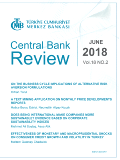
Central Bank Review
Driving insights in economics and financial policy.Central Bank Review is a leading journal published by the CENTRAL BANK REPUBLIC TURKEY, dedicated to advancing the field of economics and finance. With an ISSN of 1303-0701 and an E-ISSN of 1305-8800, this open-access journal has been serving the academic community since 2016, providing a rich source of knowledge for researchers, professionals, and students alike. The journal focuses on a diverse range of topics within economics, econometrics, and finance, making it a valuable resource for those looking to stay at the forefront of these rapidly evolving fields. Notably, in 2023, it achieved a Q2 ranking in both Economics and Econometrics and Finance, highlighting its relevance and impact within the academic community, with Scopus rankings placing it in the top quartile of its categories. Central Bank Review not only contributes to rigorous academic discourse but also offers insights and policy discussions pertinent for central banking and economic policy, solidifying its importance in shaping the future of economic research. Located in the Netherlands, this journal provides easy access to its published articles, ensuring that vital research reaches readers globally.
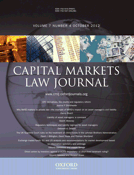
Capital Markets Law Journal
Advancing Knowledge in Capital Markets Regulation.Capital Markets Law Journal, published by the esteemed Oxford University Press, serves as an essential resource for scholars and practitioners within the realms of finance and law. Established in 2006, the journal has rapidly gained recognition, as evidenced by its respectable impact factor and its classification in the Q2 for Law and Q3 for Finance in the 2023 category quartiles. The journal's scope encompasses a wide variety of topics relevant to capital markets, including regulatory frameworks, legal innovations, and market dynamics, making it an invaluable platform for disseminating cutting-edge research. The journal is committed to fostering academic discourse while also catering to the needs of professionals seeking insights into current trends and legal interpretations affecting capital markets. Although it is not an open-access publication, readers affiliated with institutions often have access through university libraries. Situated in the heart of the United Kingdom, Capital Markets Law Journal continues to shape discussions and drive forward-thinking in an ever-evolving field.
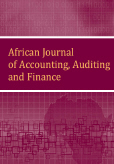
African Journal of Accounting Auditing and Finance
Fostering innovation in accounting practices continent-wide.African Journal of Accounting Auditing and Finance (ISSN: 2046-8083, E-ISSN: 2046-8091) is a prominent academic journal published by INDERSCIENCE ENTERPRISES LTD, dedicated to advancing knowledge within the fields of accounting, auditing, and finance across the African continent. With a commitment to promoting rigorous research and practice, the journal serves as a critical platform for researchers, professionals, and students to share innovative findings, best practices, and emerging trends relevant to the dynamic financial environment in Africa. As the journal navigates through a landscape of increasing complexity in financial regulations and accounting standards, it aims to foster dialogue and develop solutions for nuanced challenges faced by African economies. While currently not an open-access journal, it still maintains high scholarly standards and promises valuable insights that contribute to the development of both academic knowledge and professional practice in these key areas.